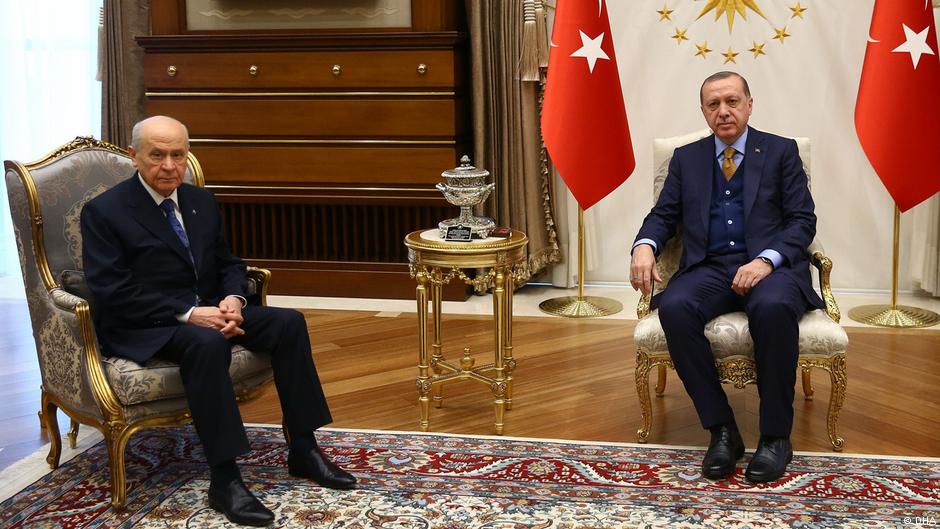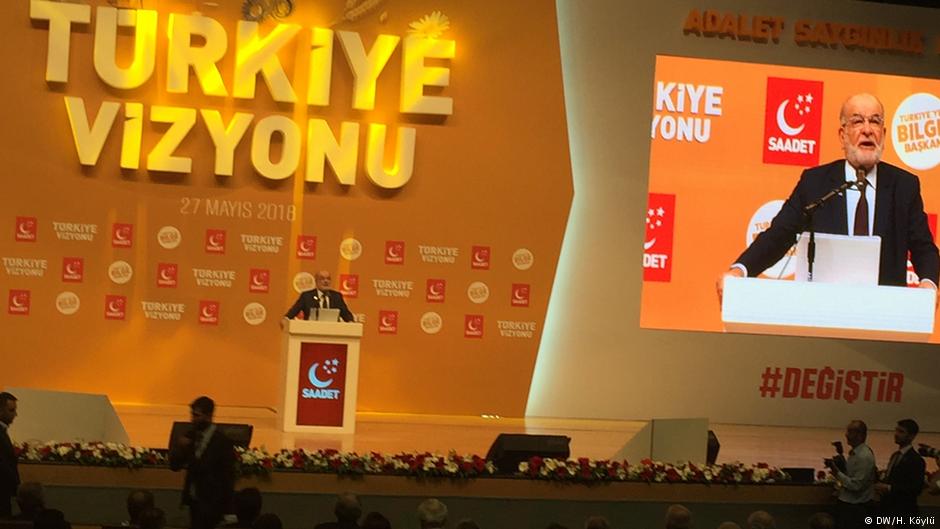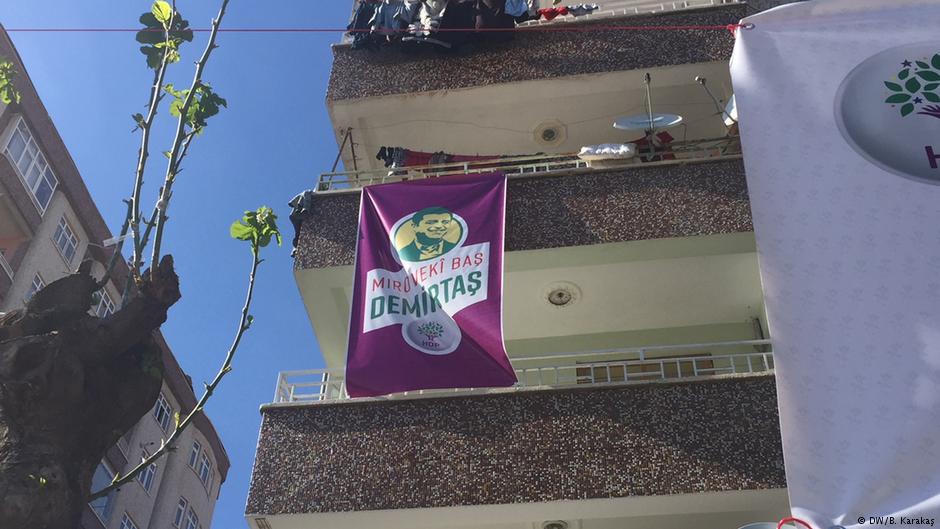The calculus of alliances

Turkey's fast-paced politics will experience many firsts in the country's snap election on 24 June, including pre-election alliances. More than 59 million voters will not only choose their president but also their political preferences for the 600-seat parliament, with some parties running as alliances – unprecedented in Turkish history. The contest is, therefore, not only between ideas, but also between the pre-election calculations of the parties.
In March of this year, the Turkish Parliament approved a joint initiative of the ruling Justice and Development Party (AK Party) and Nationalist Movement Party (MHP) to introduce pre-election alliances, following a heated night-long debate that on occasion boiled over into violence. According to the new regulation, parties can enter elections as an alliance but retain their own name on ballot papers.
Turkey's notorious 10 percent electoral threshold – harshly criticised by all opposition parties but never changed when they reach power – will remain in place, but will apply to the sum of votes for the alliance. This tricky regulation will be key to the future of Turkey, as the opposition is counting on the People's Democracy Party (HDP), the Kurdish-oriented party, passing the barrier, despite its exclusion from the newly formed alliances.
Rival turned ally
The road to these new regulations was opened by Devlet Bahceli, leader of the MHP and one-time arch-rival of the AK Party and its leader, President Recep Tayyip Erdogan.
After the coup attempt in July 2016, Bahceli's MHP backed the AK Party in the constitutional referendum of April 2017, which changed Turkey from a parliamentary democracy to a country with presidential rule.
At the same time, the MHP faced its own challenge: a number of its former deputies established a new nationalist party, the Good Party (IYI Party). The concern among the MHP rank and file was that this might erode its 12 percent support at the ballot box. These worries provided the groundwork for co-operation between the MHP and the AK Party, but the move to form a pre-election alliance took little bit more time.

Existential threats?
The constitutional amendments envisaged elections for 2019, but this all changed with a series of events that began to unfold in January.
Firstly, Bahceli said the MHP would not field a presidential candidate but would instead support Erdogan. Then, in February, he persuaded the AK Party to introduce amendments to the election law, enabling pre-election alliances. Then, in April, he demanded early elections. It is still unclear to political analysts whether Bahceli's moves were pre-arranged or designed to put pressure on the AK Party. In any case, the latter had good reason to accept the helping hand of the MHP.Last year's constitutional referendum was approved by some 51.3 percent of Turkish voters. This level of support by no means guaranteed Erdogan the presidential seat. However, an alliance with the nationalist MHP to bolster numbers may also come at the expense of losing the conservative Kurdish vote.
In the same speech in which he backed Erdogan's bid, Bahceli said the town of Afrin "should either be totally destroyed, or the terrorists over there burned". This was a reference to the largely Kurdish-populated town in Northern Syria, the site of a Turkish military intervention on grounds the town was controlled by Syrian Kurdish forces affiliated with the Kurdistan Workers' Party (PKK), perceived by Ankara as an existential threat to the nation.
This is the central point of the AK Party-MHP pre-election alliance, which has named itself the People's Alliance. The main argument of its manifesto centres on threats to Turkey such as terrorism or coups. The People's Alliance is the only solution, it claims, accusing its opponents of serving the interests of enemies of the state.
A loose alliance
When the snap election was announced, the main opposition Republican People's Party (CHP) lent 15 deputies to the IYI Party to ensure the latter's eligibility under electoral regulations.

This attempt to capture a pivotal role was a surprising move by the CHP. Not only because the party has been the subject of frequent criticism for being reactive rather than active when it comes to the AK Party, but also because the IYI Party was considered a rival.
More surprising still was the decision from the Felicity Party (SP), representing the religious National Outlook movement and the roots of the AK Party, to turn down an invitation by the People's Alliance, choosing instead to join the opposition. The SP, which lacks parliamentary representation, being unable to pass the 10-percent election barrier, may yet play a crucial role, attracting religious voters unhappy with the AK Party.
The SP teamed up with the CHP and the IYI Party to find a common presidential candidate. However, time was short and they proved unable to reach an agreement. Opting to field their own candidates, they nonetheless united to form the Nation Alliance.
Deputy Prime Minister Bekir Bozdag has framed this co-operation among the opposition parties as an "alliance of anger", claiming "what motivates them is not Turkey's interests, its future or things to be done, it is simply opposition to Recep Tayyip Erdogan."
The Nation Alliance manifesto promises separation of powers based on powerful legislation in parliament. It also underlines the concepts of rule of law, compromise and civil rights, especially freedom of expression and independent media. However, the Nation Alliance has excluded the third-biggest party in Parliament, the HDP. While the CHP and the SP signalled they might be willing to include the pro-Kurdish party, they proved unable to convince the nationalist IYI Party.

The Nation Alliance is further undermined by its multiplicity of candidates. The aim is to win a ticket to the second round, should Erdogan fail to win more than 50 percent of the votes in the first. But the current strategy means Nation Alliance candidates are competing not only against Erdogan, but also against each other.
The opposition, however, has more than one goal in mind: even if they fall short of the presidency, they are aiming at least to gain a parliamentary majority. The turnout for the IYI Party is unknown, since this will be its first election, while the SP's haul was less than 1 percent in the last election, but is certainly increasing. Reluctant voters for either party will be thinking the same thing: "the alliance means my vote will not be wasted; we can pass the election threshold".
However, this plan's success depends on the HDP's performance. It collected 10.8 percent of the vote at the previous election in 2015, but it is uncertain whether it will clear the threshold this time. If it falls short, almost all the seats in the Kurdish-speaking areas will go to the AK Party. Estimates suggest the HDP's failure to make it to parliament would translate to around 60 more seats for the AK Party.
There is an expression in Turkish: the calculations made at home may not match the market. On 24 June, Turkey will learn which pre-election alliances' estimates have proved accurate.
Ayse Karabat
© Qantara.de 2018
